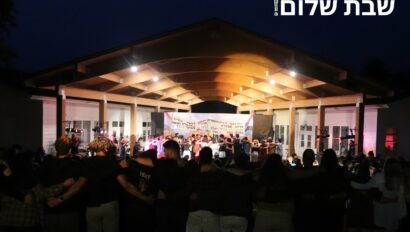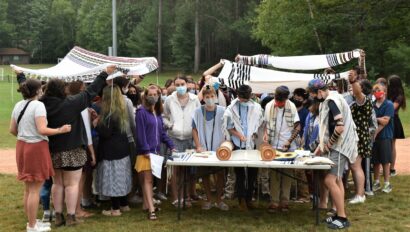Please enjoy a D’var Torah this week from Rosh Tefillah 2018 Jeremy Fineberg. Jeremy is an alumnus of Brandeis University and is currently in his fourth year of Rabbinical School at the Jewish Theological Seminary of America. Jeremy currently serves as the Resnick Rabbinic Intern at The Orangetown Jewish Center in Rockland County, New York, and as the Slifka Rabbinic Fellow at the Hillel at Binghamton University. A lifelong Ramahnik, Jeremy has been a counselor, Rosh Aidah, and most recently the program director at Camp Ramah in Wisconsin.
Remembering Our Stories: Reflections on Mishpatim
by Jeremy Fineberg
One of my favorite things about summers at camp is that I have time to just read. It’s not that I don’t get to read during the school year; as a 4th year Rabbinical Student I spend a great deal of my time reading. I probably read hundreds of pages every week, and often in different languages. It’s just that I don’t often get to read for pleasure. And it’s not that I don’t find my class readings enjoyable – I really enjoy studying old ideas, grasping new ones, and challenging my comprehension; it’s just that sometimes I don’t want to read about ideas. I guess what I love most about reading at camp is that I’m free to read stories. Though the characters themselves, be they heroes, villains, or just regular people, may be fictional or not, the messages, lessons, and ideas found in stories are decidedly real. With stories, the messages and meanings are shown and felt, not just told. Stories have the power to move and inspire us beyond what lesson they might command of us.
Our parashah this week, Mishpatim, is chock-full of mitzvoth. According to most counts, it contains almost 10% of the commandments found in the Torah. The vast majority of those mitzvot are “just” laws, with no stories or obvious justifications attached, like many of the laws in the Torah. However, in Mishpatim we also receive a commandment with an incredibly important and relevant story attached to it.
In Exodus 23:9, the Torah teaches us:
וְגֵ֖ר לֹ֣א תִלְחָ֑ץ וְאַתֶּ֗ם יְדַעְתֶּם֙ אֶת־נֶ֣פֶשׁ הַגֵּ֔ר כִּֽי־גֵרִ֥ים הֱיִיתֶ֖ם בְּאֶ֥רֶץ מִצְרָֽיִם׃
V’geir lo tilchatz, v’atem y’datem et nefesh hageir ki geirim heyitem b’eretz mitzrayim.
You shall not oppress a stranger; for you know the feelings of the stranger, because you were strangers in the land of Egypt.
This commandment teaches us not to mistreat the stranger because we know what it’s like to be in their shoes. Our people’s foundational story of isolation, demonization, and persecution teaches us that we must treat the stranger better than we were treated when we were strangers. We are reminded of our story to help compel us to do better, to treat the vulnerable in our midst with the respect they deserve – and which we once deserved.
While it is surely important not to mistreat the stranger, isn’t the idea kind of obvious? Aren’t we taught from a young age that we should treat others how we would like to be treated? Do we really need to cite our people’s main narrative to prove a point that was likely enshrined in laminate on the wall of our 1st grade classroom?
I think the Torah is teaching us two important things by using our national narrative as justification. The first is that this commandment, though it might appear obvious, is not easy to do. When we have power in relation to another, it is not always easy to treat them well. Sometimes we mistreat them on purpose, other times unknowingly, but both in society and in our daily lives the weak and vulnerable and stranger are mistreated and oppressed. Whether by rude comment, exclusion from a game, activity, or social group, or in the legal or social laws of society, the stranger is mistreated. We do need a heavy dose of story to jolt us out of the complacency of the normal in life and society. We need to be reminded of our story to push us to be better.
A second reason for reminding us of our story here is that what immediately follows our verse is the Torah’s first mention of Sh’mita – the seventh (sabbatical) year of a 7-year cycle that requires a complete cessation from agricultural work. For an agricultural society to completely stop planting and harvesting for an entire year is a massive societal change and creates an enormous civic challenge. It’s not just individual or interpersonal behavior that needs to change, but the entire way society functions. While not explicit in the text, the juxtaposition of our two ideas is ripe for interpretation. One lesson we can learn through this lens: we must engage in small interpersonal changes and treat the stranger better because we were oppressed strangers. And we must let the land lie fallow and engage in massive societal change because we were once overworked, undernourished, and alienated like the land our ancestors cultivated. Our story, then, inspires us to rework something small, like the relationship between two individuals, and also to transform society, something that is bigger than any one person. We need our narrative to show us what laws can only tell us. Evolution is possible no matter the scale, as long as we trust in our story to support us.
Like many who grew up on the Kikar, my camp stories are integral and cherished parts of my identity. I constantly find myself referring back to them as I make large and small changes in my life. May our personal foundation stories, whether they take place on the Garbage Trail, the Kikar, or anywhere else in the world, anchor us as individuals and communities as we move towards personal and societal growth.






